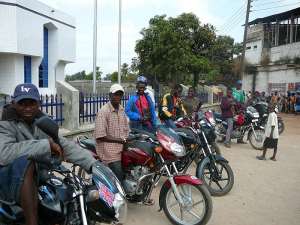
Since 2014, the Ghana Police Service has launched a campaign to clampdown on the commercialisation of motorbikes, popularly referred to as ‘Okada’, in the country.
Some of the riders have been prosecuted while others have gone scot-free. Some have parted with unspecified amounts of money to the police to get away from their grip, while others have had their motorbikes impounded.
In the rural areas, aside from the fact that cars are scarce, some of the roads are not motorable and it takes only motorbikes to be able to move people to and from those areas.
Additionally, the Okada services are far cheaper compared to the “dropping” often charged by the taxis.
So, even though the police are arresting ‘Okada’ riders, they continue to get good patronage.
The police have their reasons for moving heaven and earth to stop the commercialisation of motorbikes, and justifiably so.
But there is one area where banning the use of Okada appears to be impossible. The area is Afram Plains in the Eastern Region. The reason is simple: The area, which is entirely a farming community, has its associated problems of bad and inaccessible roads.
The only available means to those communities is either by motorbikes or tractors and since time is of the essence in their daily activities, the most convenient means, therefore, is the motorbike.
The Director in charge of Operations of the Ghana Police Service in the Afram Plains, ASP David M. Amevor, admitted that it was difficult to combat the Okada business because of the nature of the roads in the area.
He said even though he and his men were prosecuting them, “We are more concerned about the riders carrying the right documentations and doing the right thing.”
Mr Amevor said most of the riders arrested for prosecution were either riding without crash helmets, carrying more than one passenger, riding without a valid licence or without valid motor insurance.
“It is a fact that sometimes when we are going on operation, we put motorbikes in the pickup so that where the car cannot go, we use the motorbike,” he said.
He said the challenge remained that some of the riders were using the motorbikes to commit crimes and the police were on the alert to deal with such miscreants.
Mr Amevor said currently there were a number of them before the Magistrate Court at the Donkorkrom and assured that though the riders were adopting various means to outwit the police, “We are matching them boot for boot.”




 SSNIT must be managed without gov’t interference – Austin Gamey
SSNIT must be managed without gov’t interference – Austin Gamey
 Ejisu by-election could go either way between NPP and independent candidate — Gl...
Ejisu by-election could go either way between NPP and independent candidate — Gl...
 We never asked ministers, DCEs to bring NPP apparatchiks for returning officer r...
We never asked ministers, DCEs to bring NPP apparatchiks for returning officer r...
 No one denigrated the commission when you appointed NDC sympathizers during your...
No one denigrated the commission when you appointed NDC sympathizers during your...
 Used cloth dealers protests over delayed Kumasi Central Market project
Used cloth dealers protests over delayed Kumasi Central Market project
 A/R: Kwadaso onion market traders refuse to relocate to new site
A/R: Kwadaso onion market traders refuse to relocate to new site
 Dumsor: Corn mill operators at Kaneshie market face financial crisis
Dumsor: Corn mill operators at Kaneshie market face financial crisis
 Jamestown fishermen seek support over destruction of canoes by Tuesday's heavy d...
Jamestown fishermen seek support over destruction of canoes by Tuesday's heavy d...
 Election 2024: EC to commence voter registration exercise on May 7
Election 2024: EC to commence voter registration exercise on May 7
 Public schools rebranding: We’re switching to blue and white, we’re painting all...
Public schools rebranding: We’re switching to blue and white, we’re painting all...
